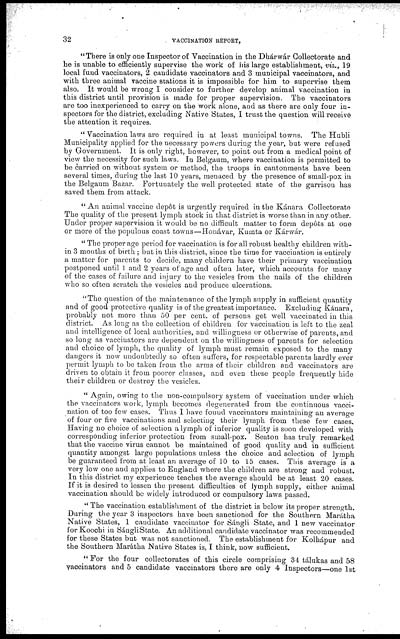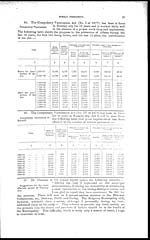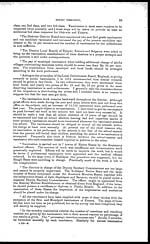Medicine - Vaccination > 1899-1928 - Report on vaccination in the Bombay Presidency > Vaccination in Bombay 1889-1901 > 1889-1890 - Report on vaccination in the Bombay Presidency, for the year 1889-90
(42) Page 32
Download files
Individual page:
Thumbnail gallery: Grid view | List view

32 VACCINATION REPORT,
"There is only one Inspector of Vaccination in the Dhárwár Collectorate and
he is unable to efficiently supervise the work of his large establishment, viz., 19
local fund vaccinators, 2 candidate vaccinators and 3 municipal vaccinators, and
with three animal vaccine stations it is impossible for him to supervise them
also. It would be wrong I consider to further develop animal vaccination in
this district until provision is made for proper supervision. The vaccinators
are too inexperienced to carry on the work alone, and as there are only four in-
spectors for the district, excluding Native States, I trust the question will receive
the attention it requires.
" Vaccination laws are required in at least municipal towns. The Hubli
Municipality applied for the necessary powers during the year, but were refused
by Government. It is only right, however, to point out from a medical point of
view the necessity for such laws. In Belgaum, where vaccination is permitted to
be carried on without system or method, the troops in cantonments have been
several times, during the last 10 years, menaced by the presence of small-pox in
the Belgaum Bazar. Fortunately the well protected state of the garrison has
saved them from attack.
" An animal vaccine depôt is urgently required in the Kánara Collectorate
The quality of the present lymph stock in that district is worse than in any other.
Under proper supervision it would be no difficult matter to form depôts at one
or more of the populous coast towns—Honávar, Kumta or Kárwár.
" The proper age period for vaccination is for all robust healthy children with-
in 3 months of birth ; but in this district, since the time for vaccination is entirely
a matter for parents to decide, many childern have their primary vaccination
postponed until 1 and 2 years of age and often later, which accounts for many
of the cases of failure and injury to the vesicles from the nails of the children
who so often scratch the vesicles and produce ulcerations.
"The question of the maintenance of the lymph supply in sufficient quantity
and of good protective quality is of the greatest importance. Excluding Kánara,
probably not more than 50 per cent. of persons get well vaccinated in this
district. As long as the collection of children for vacciuation is left to the zeal
and intelligence of local authorities, and willingness or otherwise of parents, and
so long as vaccinators are dependent on the willingness of parents for selection
and choice of lymph, the quality of lymph must remain exposed to the many
dangers it now undoubtedly so often suffers, for respectable parents hardly ever
permit lymph to be taken from the arms of their children and vaccinators are
driven to obtain it from poorer classes, and even these people frequently hide
their children or destroy the vesicles.
" Again, owing to the non-compulsory system of vaccination under which
the vaccinators work, lymph becomes degenerated from the continuous vacci-
nation of too few cases. Thus I have found vaccinators maintaining an average
of four or five vaccinations and selecting their lymph from these few cases.
Having no choice of selection a lymph of inferior quality is soon developed with
corresponding inferior protection from small-pox. Seaton has truly remarked
that the vaccine virus cannot be maintained of good quality and in sufficient
quantity amongst large populations unless the choice and selection of lymph
be guaranteed from at least an average of 10 to 15 cases. This average is a
very low one and applies to England where the children are strong and robust.
In this district my experience teaches the average should be at least 20 cases.
If it is desired to lessen the present difficulties of lymph supply, either animal
vaccination should be widely introduced or compulsory laws passed.
" The vaccination establishment of the district is below its proper strength.
During the year 3 inspectors have been sanctioned for the Southern Marátha
Native States, 1 candidate vaccinator for Sángli State, and 1 new vaccinator
for Koochi in SángliState. An additional candidate vaccinator was recommended
for these States but was not sanctioned. The establishment for Kolhápur and
the Southern Marátha Native States is, I think, now sufficient.
" For the four collectorates of this circle comprising 34 tálukas and 58
vaccinators and 5 candidate vaccinators there are only 4 Inspectors—one 1st
Set display mode to: Large image | Zoom image | Transcription
Images and transcriptions on this page, including medium image downloads, may be used under the Creative Commons Attribution 4.0 International Licence unless otherwise stated. ![]()
| Permanent URL | https://digital.nls.uk/91029577 |
|---|
| Attribution and copyright: |
|
|---|




